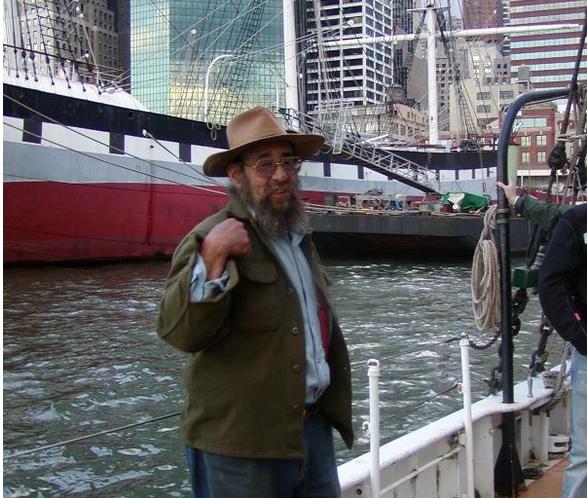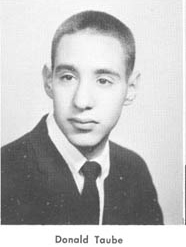Captain Donald Taube (1942-2007)
by Bryan Waterman
I'm not the only one who can't believe Don,s gone.
Don Taube- some call him Captain Don was a fixture in our seaport neighborhood. He lived on a ship in the harbor. He drank tea and talked and checked his email at Fresh Salt, our local bar. (He loved the cookies, too.) He was a relief captain on the South Street Seaport Museum's historic schooner, the Pioneer, as well as on the Poughkeepsie-based Pete Seeger brainchild, the Clearwater.
Don died at his home in North Carolina, where he'd return occasionally to cut the grass and such. He was cutting the grass when he was hit by a stroke. I'm sure he'd rather have gone while he was working, but nevertheless it was much too soon.
I met Don at Fresh Salt nearly three years ago, right after it opened. Along with the workers from the Fulton Fish Market, Don initially served, for me, as something of local character, one of the last vestiges of the Port of New York. But before long I counted him as much more than a prop, as more than a family friend, even. He'd become family. If I were at Fresh Salt without Stephanie he'd greet me with a handshake and ask when she was coming down; if we were both there he'd greet her with a kiss on the cheek and ask about the kids or about friends who weren't there.
Don wore a full sailor's beard, especially in the winter, though other times it might be shaved back just to the long, bushy moustache. Most days, he had diesel fuel on his fingers and his overalls. (If he wasn't wearing overalls he wore red suspenders.) Unlike the fish guys, he drank tea instead of light beer or harder booze. He read the papers and could sit, a quiet presence on the corner stool, as long as he needed to, no matter what other clientele walked through the doors, day or night. Once the bar had established itself, picking up a regular happy hour crowd of city lawyers and occasional Wall St. types, it was refreshing to find Don there or to have him walk in while you were looking for a familiar face. When his daughter, Jessica, started tending bar there, he showed up even more regularly, stayed later. He never drank, and sometimes wished the music were lower, but the bar became, for him, an extension of home. He kept his computer in the back closet, with the board games. Some of the regulars helped him hone his online dating profiles.
Once, when a bartender came in sick, then nearly collapsed and had to lie down, Don called Jessica to have her come and fill in, then jumped behind the bar to pull beers until she got there, and though he didn't drink, he somehow knew all the right prices. (I've heard it said that you know you live in a neighborhood when your butcher shows up at your funeral; I think you can tell it, too, when the regulars can staff the bar in a pinch.) If the place got packed, especially if Jess were working, he'd clear tables, stacking pint glasses and bringing them down to the bar. I'm not sure how the happy hour crowd took to a sailor busing their tables, but I'd like to think their corporate lives had a little more vitality for the interaction, however brief.
Don first let me have it over a bagel. Counting carbs and calories, I asked for butter and jelly rather than cream cheese. Don said, "Not from around here, are you?" The idea of butter on a bagel seemed, well, downright unkosher. In some ways, Don was traditional, but he never did anything simply for tradition's sake. If he couldn't make rational or emotional sense of it, it probably wasn't worth doing.
Don wore a variety of hats, from the blue-and-white striped locomotive engineer's to the broad-brimmed straw hat to the red bandanna tied tight, pirate-style. I've written about this here before, but he once told me that he categorized men based on the kinds of hats their faces can get away with, and Don, let me say it, was the kind of guy who could wear a range of hats and get away with each and every one.
He'd have a surprise in each one too. I didn't expect it, just getting to know him, when he told me about his intense intellectual childhood in Washington. (His dad had worked on the Manhattan Project.) Another time he let it slip that he'd once planned to be a philosophy professor, and had dropped out of his own Ph.D. program at Columbia in the mid-60s after his adviser left the university. Before he was a professional sailor, Don had worked for IBM, teaching computer science. Though you'd guess none of these things when you were lucky enough to inhabit the next barstool, they became clear enough over time: Don was a walking google search, more than an encyclopedia. He could give you the right answer, or his own educated opinion, on just about everything, from the efficacy and limitations of religion to shucking oysters. And then he'd tell you how all the other theories on those subjects were flawed.
Last spring, one of my students interviewed Don for a couple pieces she had to write for journalism classes. Although I'd been friends with Don for more than two years, I still found a few surprises in what she came up with. Like the fact that his favorite novel was The Princess Bride, for instance. I'd also never heard the story about how he became a sailor: As a child in DC he'd suffered from acute asthma. His parents sent him to a camp in Canada to escape the pollen: "It was that summer at Camp Wabikon", my student wrote, "that Taube first took control of a boat on his own. He learned canoeing and sailing, and for the first time in his life, he was freed of daily asthma." When I imagine a ten-year-old Don taking the helm, I like to imagine that for the first time in his life he was free. (His friends know what it meant to him that in the last year he'd initiated the process of buying his own boat, a large flat-bottomed vessel that could ease in and out of any corner in the Brooklyn or Manhattan waterfronts. "We'll get all the way back in the Gowanus Canal," he said, with no small amount of glee.)
Though he'd lived in North Carolina for years, Don moved back to New York and took up a regular job for the Seaport Museum in 2001. He sailed as a relief captain on the Pioneer and did maintenance work on the museum's fleet and on the Clearwater, with which he'd been associated since 1969. He came back to New York to be closer to Jessica, a dancer, who was at school at first in Philadelphia and then at Hunter College. His wife, June, had died of breast cancer the year before, something he didn't like to talk about much, except for the fact that it informed both his abstinence from alcohol and his observance of high holidays. These were the times Don cleaned up nice. He'd show up at the bar to meet Jessica on their way to synagogue. In the last year Don had been going through his own cancer scare, something that he dreaded, most of all, for what it might mean for Jessica to go through such an ordeal again.
 I'm in Boston this summer and feel somewhat helpless, removed from neighborhood gestures of grief and support. I can't imagine heading down to the seaport in the fall and not finding him there, or going out on a harbor sail and not hearing his list of rules for the passengers. He always asked when my classes were meeting but we never managed to have him visit.
I'm in Boston this summer and feel somewhat helpless, removed from neighborhood gestures of grief and support. I can't imagine heading down to the seaport in the fall and not finding him there, or going out on a harbor sail and not hearing his list of rules for the passengers. He always asked when my classes were meeting but we never managed to have him visit.
At the bar, I've heard from friends, there's a vase of white roses and a candle burning at his corner stool. I hope his friends (from whatever realm of his multifaceted life) will feel free to leave their stories and sentiments here as another kind of marker.
My world's richer for having had Don in it and a little more mortal (more damaged) when I think of him gone. Don Taube, salt of the earth, one of the good guys: I'll look for you this fall in the stars over the harbor.

Return to Memoriam

 I'm in Boston this summer and feel somewhat helpless, removed from neighborhood gestures of grief and support. I can't imagine heading down to the seaport in the fall and not finding him there, or going out on a harbor sail and not hearing his list of rules for the passengers. He always asked when my classes were meeting but we never managed to have him visit.
I'm in Boston this summer and feel somewhat helpless, removed from neighborhood gestures of grief and support. I can't imagine heading down to the seaport in the fall and not finding him there, or going out on a harbor sail and not hearing his list of rules for the passengers. He always asked when my classes were meeting but we never managed to have him visit.
